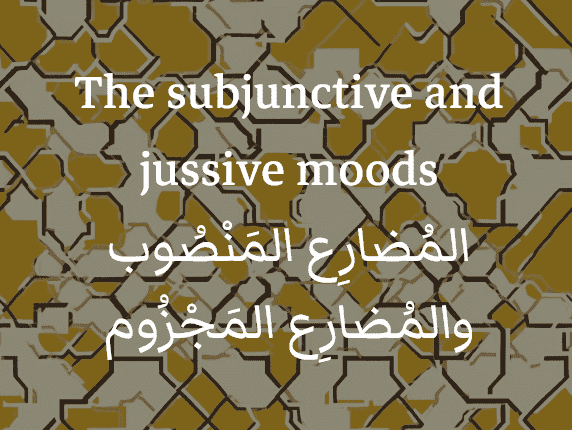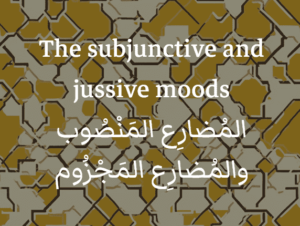The subjunctive and jussive moods / المُضارِع المَنْصُوب والمُضارِع المَجْزُوم

The subjunctive and jussive in Arabic are important grammatical structures. Both moods are formed by modifying the endings of the verb, and they have specific rules for their use in different contexts. In this lesson, we will explore the subjunctive and jussive moods in Arabic, their formation, usage, and examples to help you master these important grammatical structures.
Subjunctive mood
The imperfect subjunctive mood / المُضارِع المَنْصوب
In the subjunctive mood, we use the imperfect indicative (المُضارِع المَرْفوع) and modify the verb endings by:
- replacing the final ḍamma ( ُ ) with a fatḥa ( َ )
- dropping the نَ for endings having it as their final syllable → pronouns أَنْتِ – أَنْتُم – هُمْ – أَنْتُما – هُما
- No modification for the feminine plural
| مُثَنّى (dual) | جمع (plural) | مُفْرَد (singular) | المُضارِع المَنْصُوب Imperfect subjunctive | |
| نَحْنُ نَفْعَلَ | أنا أفَعَلَ | المُتَكَلِّم 1st person | ||
أَنْتُما تَفْعَلا | أَنْتُمْ تَفْعَلُوا | أَنْتَ تَفْعَلَ | المُذَكَّر masc. | المُخاطَب 2nd person |
| أَنْتُنَّ تَفْعَلْنَ | أََنْتِ تَفْعَلِي | المُؤَنَّث fem. | ||
| هُما يَفْعَلا | هُمْ يَفْعَلُوا | هُوَ يَفْعَلَ | المُذَكَّر masc. | الغائِب 3rd person |
| هُما تَفْعَلا | هُنَّ يَفْعَلْنَ | هِيَ تَفْعَلَ | المُؤَنَّث fem. | |
✨ Try out the automatic verb conjugator here
The subjunctive particles / حُرُوف النَصْب
The imperfect subjunctive mood is introduced by subjunctive particles (حُرُوف النَصْب) which are divided into two categories:
- Subordinate clause particles
- Future tense negation particle
Subordinate clause particles
The imperfect subjunctive mood is predominantly employed in subordinate clauses following the accompanying subjunctive particles, signaling an action that is either externally triggered or internally induced. The list of these subjunctive particles includes:
| لِـ | إِذَنْ | أَنْ | كَي | فَـ | حَتّى |
| in order to / to | then / in that case | that / to | to, so that, in order to | so that | so that, in order to |
| He asked for water to drink | طَلَبَ الماءَ لِيَشْرَبَ |
| Then you fight with courage | إِذَنْ تُقاتِلَ بِشَجاعةٍ |
| You have to learn how to drive | يَجِبُ أَنْ تَتَعَلَّمَ السِياقةَ |
| They (two) sat to rest | جَلَسَا كَيْ يَسْتَرِيحا |
| Come with her, so that she’ll show you something | تَعالَ مَعها فَتُرِيَكَ شَيْئًا |
| We smile so that you don’t see our anger | نبْتَسِمُ حتّى لا ترى غَضَبَنا |
Note: Prepositions ‘after’ بَعْدَ and ‘before’ قَبْلَ can be followed by the subjunctive particle أَنْ, leading to a verb in the subjunctive mood.
I took a breakfast before leaving my house أَفْطَرْتُ قَبْلَ أَنْ أَخْرُجَ مِنْ بَيْتي They (usually) fall asleep after watching TV يَنامُون بَعْدَ أَنْ يُشاهِدوا التِلفاز
Note 2: There is also a negative form for particles أَنْ / كَيْ / حَتّى
حَتّى لا كَيْلا لِئَلاّ ألاّ in order not to in order not to in order not to that not, not to
They (feminine) ask her not to do that طَلَبْنَ مِنْها أَلاّ تَفْعَلَ كَذا I was careful so nobody would rob me حَذَرْتُ لِئَلاّ يَسْرَِقَنِي أَحَدٌ He kicked him out so he wouldn’t come back طَرَدَهُ كَيلا يَعُودَ she kissed her son so that he would not cry قَبَّلَتْ اِبْنَها حَتّى لا يَبْكِي
Note 3: In much the same way as an English infinitive, a verbal noun (مَصْدَر) can replace a subjunctive mood in any subordinate clause and be used as verb.
I like to rest أُحِبُ الاِسْتِراحةَ He hates walking in the woods يَكْرَهُ المَشْي فِي الغابةِ
Future tense negation particle / لَنْ
To express negation in the future tense we use the subjunctive particle لَنْ with a verb in the imperfect subjunctive mood.
Future tense negation = لَنْ + المُضارِع المَنْصوب
| I won’t lie | لَنْ أَكْذِبَ |
| You (plural) won’t come with me | لَنْ تَذْهَبُوا مَعِي |
Jussive mood
The imperfect jussive mood / المضارِع المَجْزوم
In the subjunctive mood, we use the imperfect indicative and modify the verb endings by:
- Replacing the final ḍamma ( ُ ) with a sukūn ( ْ )
- Dropping the نَ for personal endings having it as their final syllable ? pronouns أَنْتِ – أَنْتُم – هُمْ – أَنْتُما – هُما
- No modification for the feminine plural
| مُثَنّى (dual) | جمع (plural) | مُفْرَد (singular) | المُضارِع المَجْزُوم Imperfect jussive | |
| نَحْنُ نَفْعَلْ | أنا أفَعَلْ | المُتَكَلِّم 1st person | ||
أَنْتُما تَفْعَلا | أَنْتُمْ تَفْعَلُوا | أَنْتَ تَفْعَلْ | المُذَكَّر masc. | المُخاطَب 2nd person |
| أَنْتُنَّ تَفْعَلْنَ | أََنْتِ تَفْعَلِي | المُؤَنَّث fem. | ||
| هُما يَفْعَلا | هُمْ يَفْعَلُوا | هُوَ يَفْعَلْ | المُذَكَّر masc. | الغائِب 3rd person |
| هُما تَفْعَلا | هُنَّ يَفْعَلْنَ | هِيَ تَفْعَلْ | المُؤَنَّث fem. | |
✨ Try out the automatic verb conjugator here
The jussive particles / حُرُوف الجَزْم
The imperfect jussive mood is introduced by two jussive particles (حُرُوف الجَزْم) which are:
- The past tense negation particle lam (لَمْ)
- The prohibition particle lā (لا)
Past tense negation particle (لَمْ)
To express negation in the past tense we use the subjunctive particle لَمْ with a verb in the imperfect jussive mood.
Past tense negation = لَمْ + المُضارِع المَجْزوم
| I didn’t understand anything | لَمْ أَفْهَمْ شَيْئًا |
| They didn’t visit them two at hospital | لَمْ يَزُورُوهُما فِي المُسْتَشْفَى |
Note: The more archaic way to express past tense negation would be with particle ما followed by a verb in the perfect tense
ما + الماضِي = لَمْ + المُضارِع المَجْزوم
I didn’t understand anything ما فَهِمْتُ شَيْئًا They didn’t visit them two at hospital ما زاروهُما فِي المُسْتَشْفَى
Prohibition particle (لا)
Prohibition is a negative imperative tense. To express negation in the imperative tense we use the particle لا with a verb in the imperfect jussive mood.
Prohibition = لا + المُضارِع المَجْزوم
| Don’t disturb the neighbours | لا تُزْعِجْ الجِيرانَ |
| Do not (plural) be lazy! | لا تَتَكاسَلوا |
The subjunctive and jussive moods

Master the Subjunctive and Jussive Moods in Arabic! Learn how to express wishes, desires, and hypothetical situations using the subjunctive and jussive moods with our comprehensive guide.
Course Provider: Organization
Course Provider Name: ArabiKey
Course Provider URL: https://arabikey.com
5

Responses